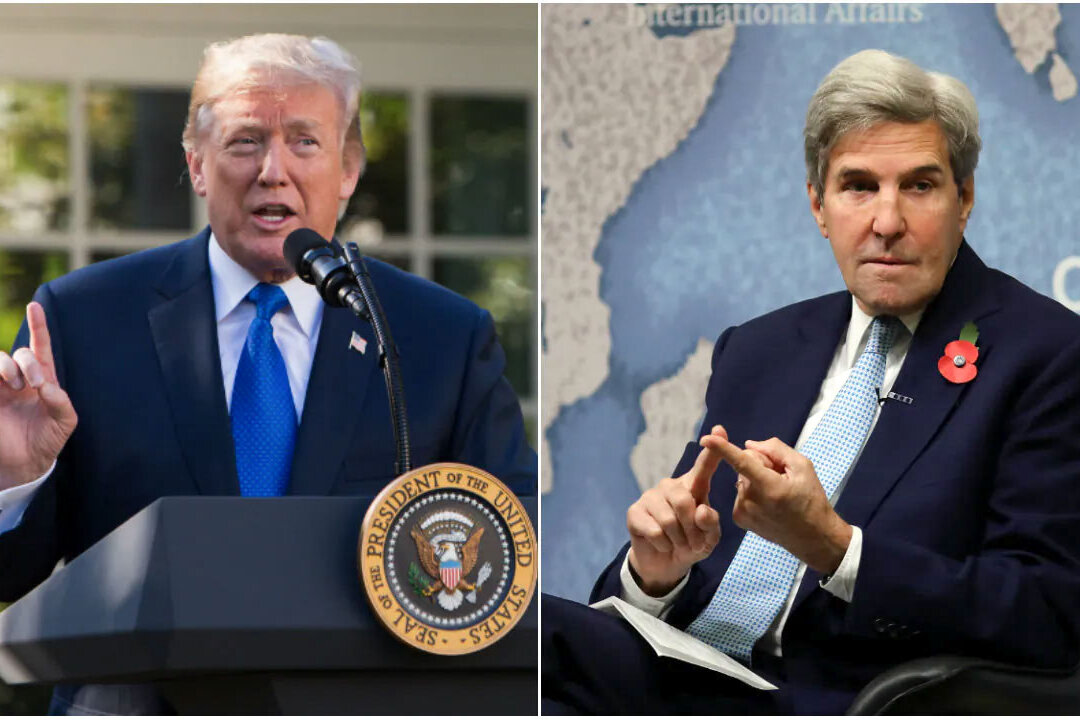‘It could be helpful in a negotiation for them to worry about you and not know where you’re coming from,’ the former secretary of state said.
The Biden administration’s top climate negotiator, former Secretary of State John Kerry, said President-elect Donald Trump’s “unpredictability” could be an advantage in dealing with adversaries.
“He makes unpredictability a virtue, and it actually can be helpful,” Kerry said on Nov. 21 at an event hosted by Harvard University’s Institute of Politics.
“It could be helpful in a negotiation for them to worry about you and not know where you’re coming from,” he said in response to a question about U.S. negotiations over Iran and Middle Eastern terrorism.
That could give Trump’s foreign policy team latitude at the start of negotiations with foreign powers because it would allow Trump to first establish the terms before offering any material proposals, Kerry said. Trump’s foreign policy team likely will be headed by Sen. Marco Rubio (R-Fla.), his choice for secretary of state.
“When you’re just starting out and you’re trying to find your ground and you don’t know exactly where you’re going to be able to go, it’s not a bad thing for them to worry about you a little bit and what you might do,” he said. “You can’t play that all the way through a negotiation, but it’s a good place to begin.”
Kerry, the Democratic Party’s 2004 nominee for president who ultimately lost to then-incumbent President George W. Bush, said that he believes that Trump wants to come to an agreement with Iran, as well as China, another U.S. adversary. Kerry also said he hopes that Trump can perform well and negotiate better than previous presidential administrations on key issues.
“I think President Trump will want to try to prove that he’s a better negotiator,“ Kerry said, referring to President Joe Biden’s recent talks with Chinese leader Xi Jinping. ”So more power to him. I hope he does.”
“I believe there are some opportunities available to President-elect Trump to be able to open up some really important negotiations,“ he said, referring to Iran. ”And I hope he will do that. I hope he will.”
Meanwhile, Kerry was critical of Trump for pulling the United States out of the 2015 Iran nuclear deal—which Kerry helped draft during the Obama administration—because, according to Kerry, it was “the strongest nuclear agreement that the United States has signed since the 1950s.”
The Trump administration in 2018 withdrew the United States from the pact, which had lifted previous sanctions on the Islamic regime, saying the deal “enriched the Iranian regime and enabled its malign behavior, while at best delaying its ability to pursue nuclear weapons and allowing it to preserve nuclear research and development.”
Trump is also unlikely to promote Biden-style climate policies, Kerry said, pointing to the president-elect’s pledge to increase production of oil and gas with his slogan of “drill, baby, drill.” He then said that pursuing a more liberal-leaning climate agenda would be better for the U.S. economy in the long term, although he did not provide specifics.
During his first term in office, Trump was critical of Kerry amid reports that the former senator from Massachusetts colluded with Iran to keep the nuclear deal alive after he left his secretary of state post.
In a May 2018 Twitter post, Trump said his administration “does not need” Kerry’s diplomacy on the Iran deal, which he said was “badly negotiated” and created a “mess.”

